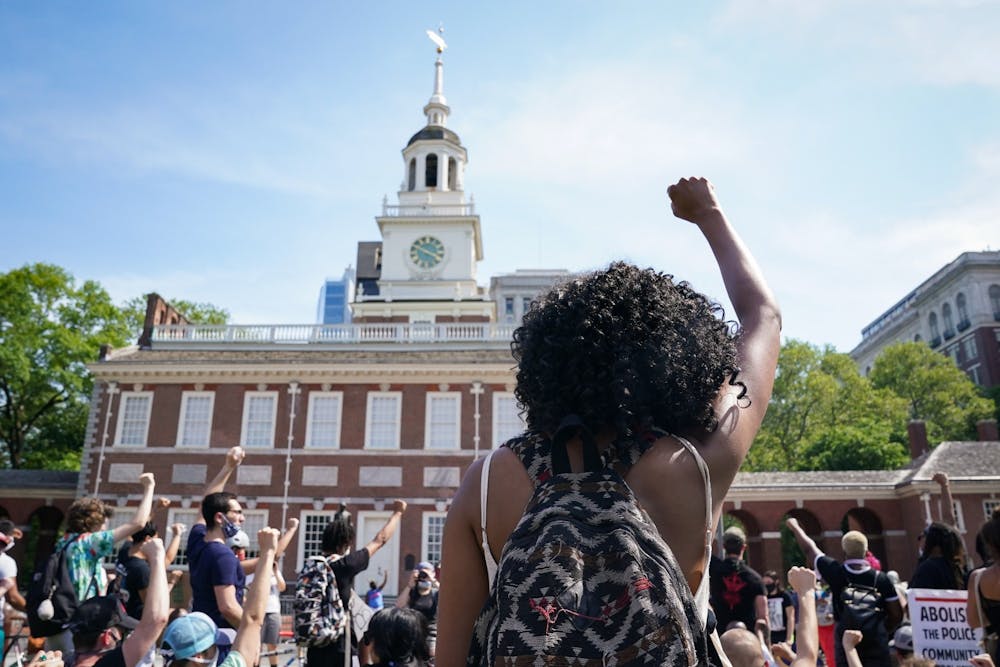
A demonstrator raises her fist in front of Independence Hall during a Black Lives Matter protest on June 4, 2020.
Credit: Chase SuttonThis is part of a series on Juneteenth, the anniversary of the emancipation of enslaved people in the United States. In their columns, members of the Penn community evaluate slavery, Penn’s relationship to it, and how this informs our understanding of race today.
For the first time in Penn’s history, the university will be hosting an official Juneteenth program.
This statement may raise a few basic questions for readers: Why is Penn commemorating Juneteenth? And what is it?
Summer 2020 ushered in waves of transformation throughout the country. As people came together to protest racial violence in the wake of George Floyd’s murder, corporations, organizations, and institutions responded in various ways. Last Juneteenth, Penn featured Chaplain Rev. Dr. Chaz Howard’s call for a day of reflection and conversation. A week later, Penn announced that Howard had been named Vice President for Social Equity and Community, a new role to help the university be more thoughtful and intentional about social change. Also last summer, campus groups mobilized around police abolition, reparations, anti-racism, and more. There is still much to be done, but creating an opportunity to formally recognize Juneteenth and engage in meaningful dialogue is a positive step. And despite Juneteenth taking place during the summer term, when campus isn’t as active, one of the benefits of interacting virtually is that students, faculty, staff, alumni, and partners from all over the globe can join Penn’s Juneteenth conversation between Wharton Dean Erika James and Ibram X. Kendi on June 18 at noon.
So, what is Juneteenth?
The short answer is that on June 19, 1865, General Order Number 3 was delivered in Galveston, Texas, formally announcing that all enslaved Africans were to be freed. You may be confused as you recall your U.S History class where you previously covered something called The Emancipation Proclamation, delivered by Lincoln in 1863. However, when you go back and revisit the Emancipation Proclamation, you will see that “freedom” wasn’t exactly freedom. Its application depended on any number of things: what part of the country you were in, what the harvest schedule was, the state of affairs of the planters and owners, and whether the planters and owners felt like they could get away with not mentioning “freedom” for a while. In Texas, owners devised the most comprehensive schemes to act like emancipation was not proclaimed so owners from other states relocated their forced labor camps there.
History isn’t straightforward or simple. What we recognize as momentous and uncomplicated events were actually fraught with tension or drawn out over years. This is why things like critical race theory matter. In critical race theory, there’s an idea called interest convergence that clearly explains how the prominence of racism combined with economic motivations can put and keep people in bondage. Entire states are bringing critical race theory into question because they believe it teaches hate and revises American history to something other than what actually occurred, yet most grade school children will erroneously tell you that “Lincoln freed the slaves.”
The truth about emancipation is far more complicated, and Juneteenth’s reality only scratches the surface. Critical race theory aims to help us know better, and thus ideally also do better. But critics of critical race theory seem invested in skipping past the truths contained within the details. It’s almost as if the longer you can keep information from people, the longer you can control them, all while convincing them that it’s for their own good. Interest convergence reminds us that those who hold power are rarely concerned for anyone else’s wellbeing unless it aligns with their own.
Furthermore, Juneteenth exemplifies another powerful aspect of critical race theory: narrative. Through Juneteenth celebrations, Black people — who have always been people, held for a portion of our contemporary timeline in captivity by other people — claim freedom possibilities and connections to a collective memory and future beyond slavery. They do the critical race work of telling their own stories. And within these stories is the underlying spirit that despite everything done to us, we are still here, creating life and joy, on our own terms.
I hope that each of us can wrestle with the dualities of freedom and suppression and liberty (God-given to some, in the American construct), as well as liberation (continually fought for by others). Juneteenth is an essential reminder that we are not free until we are all free. If we are not willing to honestly confront the pains of our full history, then the freedom that we imagine as a nation will never actually be attainable by any of us.
BRIAN PETERSON is the director of Makuu: The Black Cultural Center. He is a 1993 Engineering graduate and received his doctorate in 2013 from the Graduate School of Education. His email is peterson@upenn.edu.
The Daily Pennsylvanian is an independent, student-run newspaper. Please consider making a donation to support the coverage that shapes the University. Your generosity ensures a future of strong journalism at Penn.
Donate







